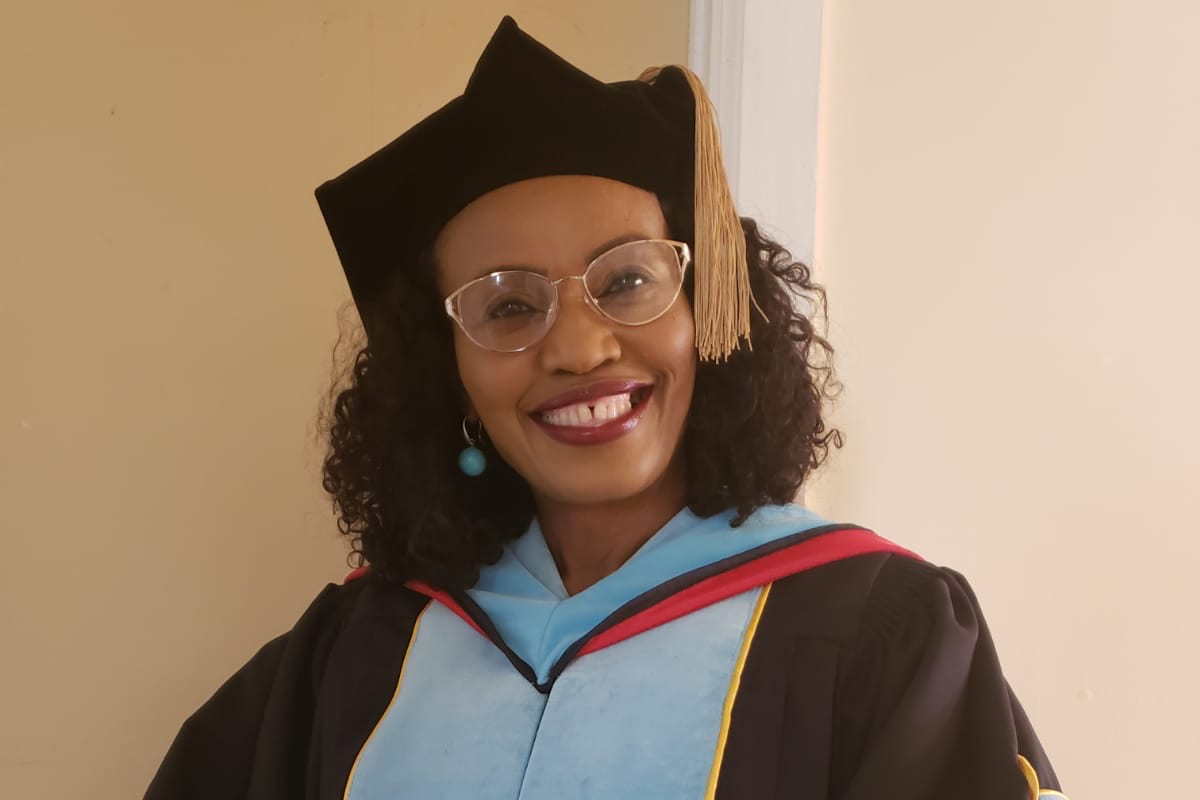Born in Nigeria, Nnenne Onwuzo grew up with her parents and six brothers. She often found herself tagging along with them, climbing trees and playing sports. As she grew up, she played volleyball and tennis — but badminton was her favorite sport. Onwuzo competed at the national level, winning multiple gold medals. She even qualified for the 1978 Commonwealth Games, but in protest of New Zealand’s continued involvement with apartheid-era South Africa, Nigeria’s president withdrew his country from the games. “I was disappointed that I couldn’t compete and prove that I could win a gold medal at the international level, but I knew the decision for Nigeria not to participate in the games was the right one,” Onwuzo said.
Onwuzo graduated with both her bachelor’s and master’s degrees from the University of Nigeria in public health education. After completing her studies, she began working as an instructor at a women’s training college, preparing women to teach in primary schools. In 1993, Onwuzo was awarded a grant to participate in an international exchange program.
The program brought her to the United States, where she worked at the Franklin County Educational Council in Ohio. In Ohio, Onwuzo was a mentor for children enrolled in after-school programs, with a focus on preparing them for, and encouraging them to consider, going to college. She was engaged in multicultural education initiatives and presented on the Nigerian education system. At the end of her time in the exchange program, Onwuzo was presented the Governor’s Award for Excellence in recognition for her work in education.
After participating in the exchange program, Onwuzo returned to Nigeria with her husband and children. She spent her time in Nigeria teaching and caring for her family, but she always had the hope of returning to school to pursue a doctoral degree. She had just begun a PhD program when one of her children became ill. “Family comes first,” Onwuzo said. “So I had to put my studies on hold to take care of my daughter.”
In the following years, Onwuzo and her family relocated to New York and became U.S. citizens. She felt the urge to continue her education rising again. “When you have an unfinished project, it stares you in the face until it’s complete,” Onwuzo said. So, she began researching programs and came across Maryville Online’s Doctor of Education — Higher Education Leadership program. It was exactly what she was looking for.
“At first, it was difficult for me to adjust to online classes and learn the technology,” Onwuzo said. “But by the time I finished the program, I could do it all on my own.” When the coronavirus pandemic hit and workplaces and businesses began moving their services online, Onwuzo felt prepared. “There were many people who had not even heard of Zoom, but I had been using it for classes over the past few years,” she said. “Maryville prepared me technologically for this new way of life we’re experiencing.”
Jason Castles, EdD, assistant professor of higher education leadership, echoed Onwuzo’s feelings of preparation. “When the pandemic hit, our students were able to take what they’ve learned from our program and apply it — not just technologically, but also from a leadership perspective, too,” he said. “Courses like Change in Higher Education gave them the theoretical framework needed to navigate this time in their respective institutions.”
With just weeks left before her graduation from Maryville, Onwuzo began to feel ill. She tested positive for COVID-19 and spent the following weeks at home recovering. “I wouldn’t wish the virus on my worst enemy,” she said. “I can’t explain the exhaustion. I couldn’t stand up. I felt so weak, I couldn’t even talk. It was terrible.”
At the same time, the last step of her program was quickly approaching. She had written and defended her dissertation, and now all that stood between Onwuzo and her EdD was the “professional conversation.” All students in the program complete their coursework by meeting with a committee of faculty to review a portfolio of their work from their time in the program. During the professional conversation, the student and committee meet virtually and reflect on the student’s growth, their professional goals and takeaways from the program. Once the professional conversation is complete, it is the end to the EdD program.
Though her husband was hospitalized due to COVID-19 and she herself was still recovering from the virus, Onwuzo knew she didn’t want to push off her dream any longer. “We were flexible and told Onwuzo that we could reschedule her professional conversation once she was fully recovered and her husband was home and safe,” Castles said. “But she wanted to do it. She said she needed something to celebrate.”
Onwuzo completed the professional conversation from her home via Zoom, stopping to catch her breath when needed. “Once it was over, I can’t explain the happiness I felt,” she said. “It was like a weight had been lifted from my shoulders. Getting a doctoral degree was my dream, and I finally achieved it!”
